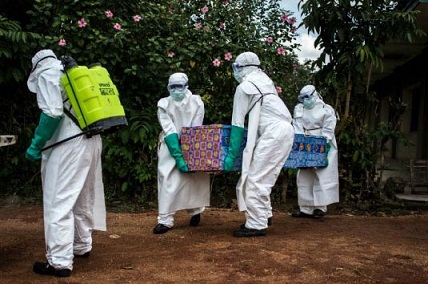Doctor warns that Mpox deaths can occur even in healthy individuals without underlying conditions
Nikhil Prasad Fact checked by:Thailand Medical News Team Aug 24, 2024 7 months, 3 weeks, 6 days, 1 hour, 47 minutes ago
Medical News: A recent study has shed light on the fact that deaths from Mpox (Monkeypox) are not exclusively linked to underlying conditions. Contrary to popular belief, severe outcomes can also occur in healthy individuals, as evidenced by cases in the United States and Spain. This
Medical News report explores the findings of this study, emphasizing the need to rethink our understanding of how monkeypox affects different populations.
 Doctor warns that Mpox deaths can occur even in healthy individuals without
Doctor warns that Mpox deaths can occur even in healthy individuals without
underlying conditions.
Understanding the Study
Researchers from the Institute of Theoretical Biology and Medicine in Lagos, Nigeria challenge the conventional wisdom surrounding monkeypox. The study, led by Dr Paul Ola, was motivated by a critical observation: individuals who were healthy at the time of infection had succumbed to severe outcomes associated with monkeypox. This study delves into the complexities of these findings, which suggest that severe outcomes in monkeypox patients are not solely the result of pre-existing conditions.
The traditional view has been that a weakened immune system, often due to underlying health conditions, fails to clear the monkeypox virus, leading to severe outcomes and, in some cases, death. However, the researchers argue that this perspective does not account for the full reality of the disease. The study highlights cases where healthy individuals also suffered from severe outcomes, prompting a reevaluation of how the disease progresses.
Key Findings of the Study
One of the study’s most significant findings is that severe outcomes in monkeypox, such as encephalitis (inflammation of the brain), can occur even in individuals without any known pre-existing conditions. This finding was starkly illustrated by the cases reported by Spain's Health Ministry, where two otherwise healthy individuals died from encephalitis caused by monkeypox. This observation directly contradicts the assumption that only those with compromised immune systems are at risk of severe outcomes.
The researchers propose that these severe outcomes are not necessarily the result of the virus itself but rather due to the co-manifestation of different diseases within the "immunological spectrum" of monkeypox. This spectrum refers to a range of diseases that, when combined, can lead to severe outcomes even in those who were previously healthy.
The study further elaborates on the concept of the immunological spectrum, suggesting that the immune system's failure to maintain certain protective conditions can lead to the simultaneous manifestation of multiple diseases. In some cases, these diseases may be triggered by exposure to other pathogens or even by vaccination. This theory challenges the conventional understanding of immunity, which typically focuses on the destruction of pathogens by the immune system.
Implications for Public Health
These findings have profound implications for public health strategies aimed at
controlling monkeypox. If severe outcomes can occur in healthy individuals, then relying solely on identifying and treating those with underlying conditions may not be sufficient. The study suggests that the focus should shift towards understanding and maintaining the immunological conditions that prevent the co-manifestation of diseases within the monkeypox spectrum.
The researchers also highlight the importance of further research into the factors that cause these immunological conditions to disappear, thereby increasing the risk of severe outcomes. They argue that understanding these factors is crucial for developing effective preventive measures, such as vaccines or other interventions that can maintain the necessary protective conditions within the immune system.
Reevaluating the Role of Vaccines
One of the more controversial aspects of the study is its implication that vaccines, while crucial, may not be the ultimate solution if they do not address the underlying immunological conditions. The study cites historical and recent examples, such as the reappearance of severe outcomes in individuals who had been vaccinated against other diseases, to support this claim. For instance, encephalitis following COVID-19 vaccination in healthy individuals is mentioned as a case where immunological conditions failed to protect against severe outcomes.
The study’s authors suggest that vaccines should be designed or administered in a way that ensures the appearance or maintenance of these critical immunological conditions. This approach could prevent the severe outcomes that have been observed even in vaccinated individuals.
Looking Ahead: The Need for New Strategies
The study calls for a paradigm shift in how monkeypox and potentially other infectious diseases are managed. It warns that if public health strategies continue to focus solely on controlling the transmission of the monkeypox virus, they may fail to prevent the severe outcomes that can occur even when the virus itself is under control. The authors advocate for a broader approach that includes maintaining the protective immunological conditions that prevent the co-manifestation of diseases in the monkeypox spectrum.
As monkeypox continues to affect populations globally, this study underscores the need for ongoing research and adaptation of public health strategies. The traditional model of disease prevention, which relies heavily on controlling viral transmission, may not be sufficient in the face of the complex immunological interactions highlighted by this research.
Conclusion
The findings of this study are a wake-up call for the medical community and public health officials alike. They challenge the long-held belief that severe outcomes from monkeypox are only a risk for those with underlying conditions and suggest that even healthy individuals are at risk if the proper immunological conditions are not maintained. As we move forward, it will be essential to integrate these insights into our approach to managing monkeypox and other infectious diseases.
The study findings were published on a preprint server.
https://osf.io/preprints/osf/2k3dn
For the latest
Mpox News, keep on logging to Thailand
Medical News.
Read Also:
https://www.thailandmedical.news/news/miami-study-sounds-alarm-that-mpox-can-also-cause-gastrointestinal-complications-and-inflammation-of-the-rectum
https://www.thailandmedical.news/news/study-finds-that-mpox-virus-infects-human-astrocytes-causing-neuroinflammation-and-eventual-brain-damage
